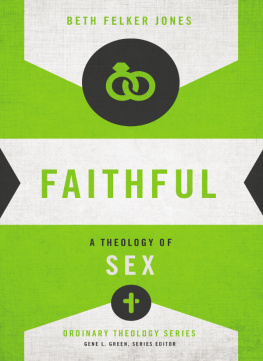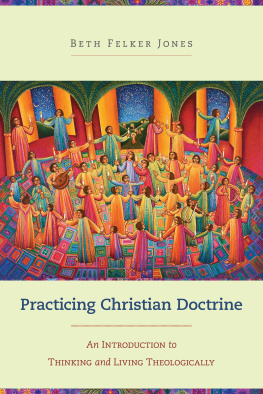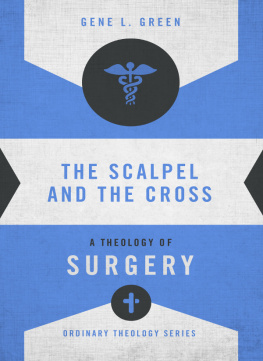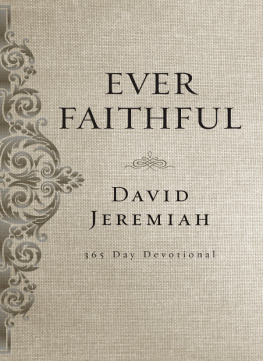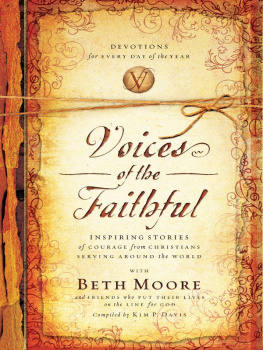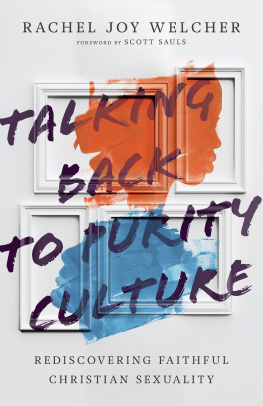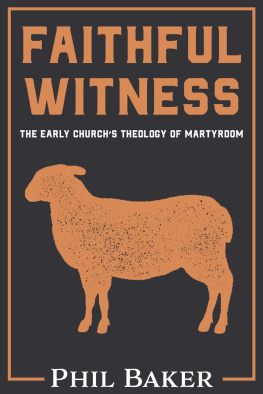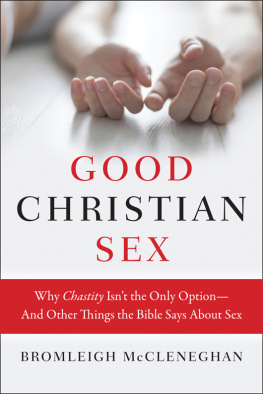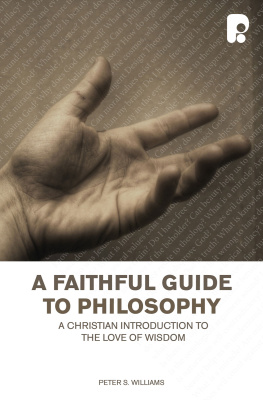
ZONDERVAN
Faithful
Copyright 2015 by Beth Felker Jones
ePub Edition March 2015: ISBN 978-0-310-51828-0
Requests for information should be addressed to:
Zondervan, 3900 Sparks Dr. SE, Grand Rapids, Michigan 49546
Library of Congress Cataloging-in-Publication Data
Jones, Beth Felker, 1976
Faithful : a theology of sex / Beth Felker Jones.
pages cm. (Ordinary theology)
Includes bibliographical references.
ISBN 978-0-310-51827-3 (softcover)
1. Sex Religious aspects Christianity. I. Title.
BT708.J65 2015
233.5 dc23
2014046213
All Scripture quotations, unless otherwise indicated, are from the New RevisedStandard Version of the Bible, copyright 1989, Division of Christian Education of the National Council Churches of Christ in the United States of America and are used by permission. All rights reserved.
Any Internet addresses (websites, blogs, etc.) and telephone numbers in this book are offered as a resource. They are not intended in any way to be or imply an endorsement by Zondervan, nor does Zondervan vouch for the content of these sites and numbers for the life of this book.
All rights reserved. No part of this publication may be reproduced, stored in a retrieval system, or transmitted in any form or by any means electronic, mechanical, photocopy, recording, or any other except for brief quotations in printed reviews, without the prior permission of the publisher.
Cover design: Mikah Kandros
Interior illustration: Beth Shagene
Interior design: Beth Shagene
15 16 17 18 19 20 21 22 23 24 25 /DCI/ 15 14 13 12 11 10 9 8 7 6 5 4 3 2 1
For my parents, Jo and Dean, and Brians parents, Luanne and Rex, who have embodied faithfulness and so shown us the love of Christ
CONTENTS
GENE L. GREEN
O RDINARY THEOLOGY. THESE TWO WORDS TOGETHER SOUND like an oxymoron. Were accustomed to thinking about theology as the stiff and stifling stuff found in ponderous tomes written by Christian scholars in ivory towers, places far removed from our ordinary lives. We live on the street, in our homes, in places of business, in schools, in gyms, and in churches. What does theology have to do with the ordinary affairs of our daily lives?
We want to bring the Bible into our lives, to be sure, and we attend church to learn about Gods Word. We read our favorite passages and wonder how ancient stories about Noah on the water or Jesus on the water relate to the checkout at the grocery store, the hours at work, the novel we read for pleasure, the sicknesses we endure, the votes we cast, or the bed on which we lie. How do we construct a bridge between the biblical worlds and the twenty-first-century world as we seek to follow Jesus faithfully? The distance between our local shopping center and Pauls forum in Athens (Acts 17) seems like an unbridgeable canyon. What does the Bible have to do with the wonderful or difficult realities we face on the baseball field or in the city? How do we receive Gods Word, which is truly for all people, at all times, in all places?
Its an old question, one the church has been asking for centuries. The Bible is a historical document with contemporary relevance. But were also aware that it doesnt seem to speak directly to many situations we face. There is no obvious biblical view of nuclear war, a kind of destruction unknown in the ancient world. What about epidemics such as AIDS, an unknown disease in the ancient world? The Noah story describes a dramatic climate change, but does that cataclysm have anything to do with global warming today? Through the centuries Christians have understood that the Bible cannot be simply proof-texted in all lifes situations. Yet we still believe that the Bible is Gods Word for us in our complex world. Enter theology.
The word theology comes from a couple of Greek terms: theos and logos. Theos means God and logos means word. Simply stated, theology is words that express thoughts about God. We hold beliefs about God such as God is love (1 John 4:8). We understand that Jesus died for our sins and that we have a hope that transcends the grave because of the resurrection of Christ. All these are theological statements. We have received Christian theology through our parents, church, and Scripture reading, and we attempt to discover how biblically based belief relates to our lives. We do theology as we take Scripture and our inherited theology and seek to work out what God is saying about the issues of today. Every Christian is a theologian.
Ordinary theology is really just another way to say theology. The expression emphasizes how theology is part of the ordinary stuff of daily life. Food is a theological topic. We can think about buying food, the need for food, those without food, selling food. What does the Bible have to say about food supply, hunger, and generosity? To ask that question is to think theologically about food. What about government welfare or foreign aid? We can think through the whole of Scripture and apply its perspectives and teachings to such issues. This is theology. And it is something every Christian can and must do. We believe that the gospel is relevant not only to our inner life, but to life in the world. The road we travel as ordinary Christians is to do ordinary theology as we work Gods message into all aspects of daily life.
The Ordinary Theology Series has a few goals. The first is to take up the common issues of daily life and think through them theologically. But another purpose of the series is to invite you to develop your skills as a theologian. These small books are examples of theological method but also a welcome into the necessary, challenging, and joyous task of doing theology. Were all called to follow the example of the first great Christian theologian whose day job was netting fish for a living. Peter did not receive training in the rabbinic schools as had Paul, yet he was the one who first understood and stated that Jesus was the Christ, the Son of the Living God (Matt. 16:16). He also opened the door of faith to the Gentiles as he came to understand that God accepts every person, regardless of ethnicity (Acts 10). Each of us can make a theological contribution to the church, our family, our community, and our own life. For your sake and the sake of others, be a theologian.
One final word about format. Each chapter begins with a story, and theological reflection follows. Theology happens in the place where Scripture meets us on the road where life is lived tensely, where thought has its birth in conflict and concern, where choices are made and decisions are carried out.the place where we find ourselves. God is concerned about people and places and does not ask us to divorce ourselves from them as we follow and serve Christ. And he gives us guidance on how to do that. So, enjoy the read! And again: be the theologian.
I NEVER INTENDED TO BE SOMEONE WHO TALKS ABOUT SEX IN public, but the subject fits together with topics Ive cared about for a long time: what place bodies have in the Christian faith and how it is that God intends us to thrive as men and women. Im willing to talk about sex because I think about my work as a theologian as work done in and with and for the church, and the people of God need to be able to think well and Christianly about sex.
Sex is a topic that matters. Its personal. Its about our day-to-day lives, about our bodies, about what we want and how we arrange our lives and how we relate to other people.
Strange ideas about sex odd ideas out of sync with those of the wider culture marked Christians out from the very beginning. The Scriptures of the Old and New Testaments speak to us about how our bodies honor God. The Bible speaks frankly about sex.
Next page
